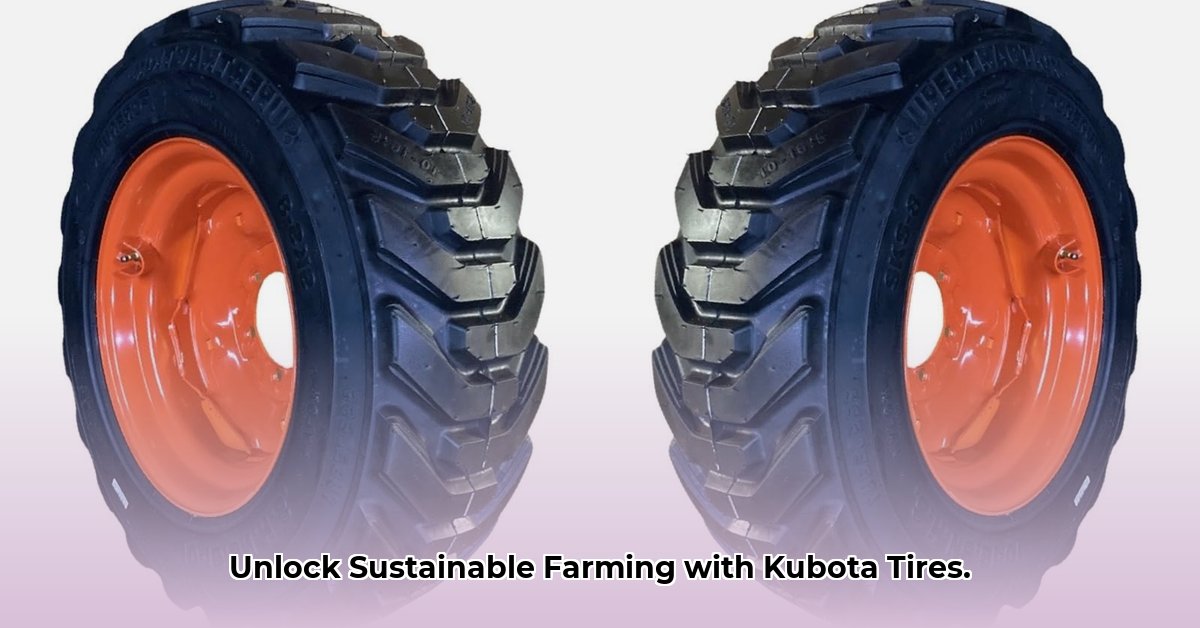
Choosing the right tires for your Kubota tractor is crucial for efficient farming and environmental responsibility. This guide simplifies tire selection, helping you optimize performance and minimize your environmental impact. For more in-depth information, check out this helpful resource on Kubota Tractor Tires.
Understanding Kubota Tractor Tire Specifications
Tire selection goes beyond size. Several key specifications significantly impact performance and soil health.
Size: Determines ground clearance and soil interaction. Larger tires generally offer better flotation (reducing compaction) in softer soils, while smaller tires are better suited for harder ground and tighter spaces.
Ply Rating: Indicates tire strength and durability. A higher ply rating (e.g., 6-ply vs. 4-ply) signifies greater load-bearing capacity and resistance to punctures, resulting in a longer lifespan and less downtime.
Tread Pattern: Influences traction and soil interaction. Deep, aggressive lugs provide superior grip in muddy conditions, while shallower patterns minimize soil compaction on hard-packed soil. The pattern choice depends on your soil type and typical working conditions.
Load Index: Specifies the maximum weight a tire can safely carry at a specific inflation pressure. Always consult your tractor's manual for accurate recommendations to avoid premature wear and potential tire failure.
Do you understand how these specs influence your farming operation? Choosing correctly ensures optimal performance and soil health.
Assessing Your Farming Needs: The Perfect Tire Match
Before selecting tires, analyze your farming needs. This ensures optimal tire performance and minimizes environmental impact.
Soil Type: Clay soils (heavy and prone to compaction) require high-flotation tires. Sandy soils (loose and prone to slippage) need tires with excellent grip.
Terrain: Flat land requires different tire characteristics than hilly or sloped terrain. Hilly or sloped terrains necessitate superior stability and traction to prevent rollovers or getting stuck.
Crops: Some crops are more sensitive to soil compaction than others. Choosing tires that minimize compaction is crucial for healthy growth and high yields.
Annual Operating Hours: Heavy use demands durable, long-lasting tires, even if they have a higher initial cost, as this results in less frequent replacements.
Consider these factors carefully; the right tire choice directly impacts your efficiency and long-term sustainability.
Choosing Sustainable Kubota Tractor Tires: Environmental Stewardship
Sustainable farming calls for environmentally conscious tire selection. Consider these factors:
Tire Lifespan: Longer-lasting tires reduce waste and resource consumption. Look for robust construction and high-quality materials to maximize tire longevity.
Fuel Efficiency: Properly inflated tires reduce fuel consumption, minimizing emissions and operating costs. Underinflation significantly increases rolling resistance, wasting fuel and increasing tire wear.
Recyclability: Choose tires made from recyclable materials and manufacturers committed to responsible disposal programs. Research the manufacturer's recycling initiatives and commitment to sustainable practices.
Manufacturing Processes: Investigate the manufacturing process for reduced environmental impact. Look for tires made with sustainable manufacturing techniques, including reduced carbon emissions and responsible sourcing.
These choices influence your farm's sustainability and reduce its environmental footprint.
Maintaining Your Kubota Tractor Tires: Maximizing Lifespan
Proper maintenance significantly extends tire life and minimizes environmental impact.
Regular Inflation Checks: Use an accurate pressure gauge to check tire pressure before each use. Underinflation leads to premature wear and increased fuel consumption.
Visual Inspections: Regularly inspect tires for cuts, embedded objects, and uneven wear. Address problems immediately to prevent major damage.
Tire Rotation: Rotate tires periodically to distribute wear evenly, extending their lifespan.
Responsible Disposal: When tires reach end-of-life, recycle them responsibly using local recycling programs.
Proper maintenance maximizes your investment and minimizes your environmental impact.
Case Study: Real-World Success
A farmer in Iowa, Joe Miller, switched to low-profile Kubota tires designed for minimizing soil compaction. He reported a 15% increase in crop yields and a 10% reduction in fuel consumption, demonstrating the significant impact of selecting appropriate tires.
Conclusion: Informed Decisions for Sustainable Farming
Selecting Kubota tractor tires is a critical decision affecting farm efficiency and environmental responsibility. This guide provides the information you need to make informed choices, maximizing profitability while minimizing your environmental impact. Remember that choosing the right tires is an investment in your farm’s future.
Key Takeaways:
- Sustainable tire choices directly influence farm profitability and environmental health.
- Understanding tire specifications is crucial for making smart decisions.
- Analyzing individual farming needs determines optimal tire characteristics.
- Eco-friendly considerations—tire lifespan, fuel efficiency, recyclability—are paramount for sustainable agriculture.
- Proper maintenance and responsible disposal prolong tire life and lessen environmental harm.
By following this guide, you can make informed decisions that positively impact both your farm's bottom line and the environment.